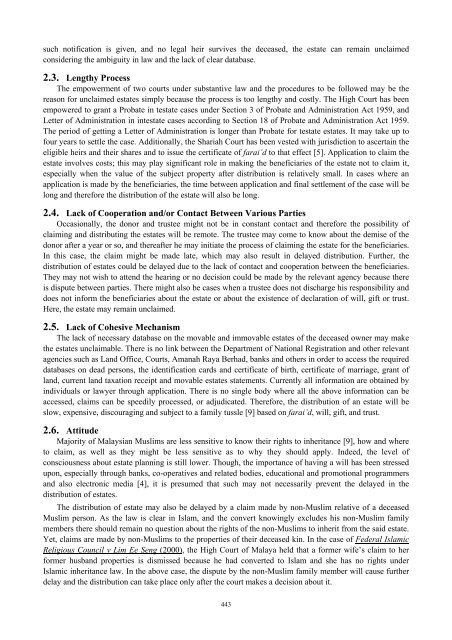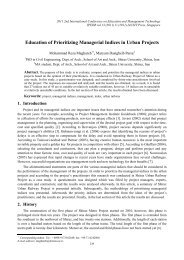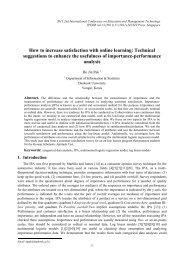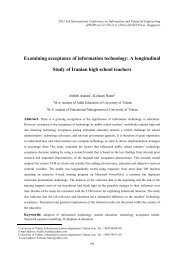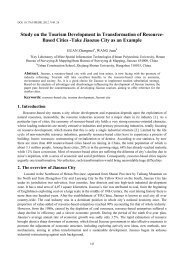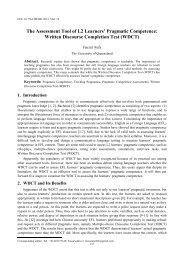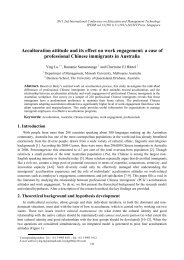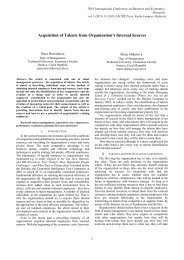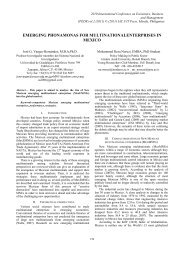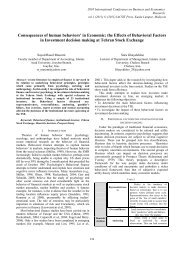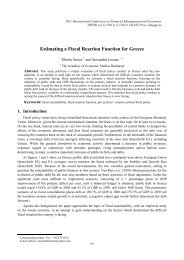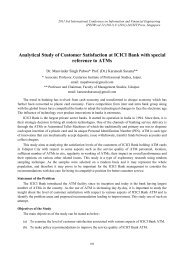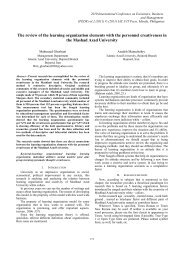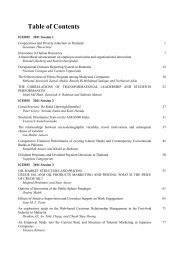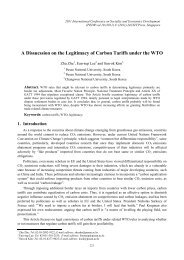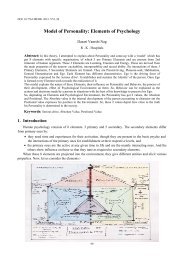The Causes of Unclaimed, Late Claimed or Distributed ... - ipedr
The Causes of Unclaimed, Late Claimed or Distributed ... - ipedr
The Causes of Unclaimed, Late Claimed or Distributed ... - ipedr
Create successful ePaper yourself
Turn your PDF publications into a flip-book with our unique Google optimized e-Paper software.
such notification is given, and no legal heir survives the deceased, the estate can remain unclaimed<br />
considering the ambiguity in law and the lack <strong>of</strong> clear database.<br />
2.3. Lengthy Process<br />
<strong>The</strong> empowerment <strong>of</strong> two courts under substantive law and the procedures to be followed may be the<br />
reason f<strong>or</strong> unclaimed estates simply because the process is too lengthy and costly. <strong>The</strong> High Court has been<br />
empowered to grant a Probate in testate cases under Section 3 <strong>of</strong> Probate and Administration Act 1959, and<br />
Letter <strong>of</strong> Administration in intestate cases acc<strong>or</strong>ding to Section 18 <strong>of</strong> Probate and Administration Act 1959.<br />
<strong>The</strong> period <strong>of</strong> getting a Letter <strong>of</strong> Administration is longer than Probate f<strong>or</strong> testate estates. It may take up to<br />
four years to settle the case. Additionally, the Shariah Court has been vested with jurisdiction to ascertain the<br />
eligible heirs and their shares and to issue the certificate <strong>of</strong> farai’d to that effect [5]. Application to claim the<br />
estate involves costs; this may play significant role in making the beneficiaries <strong>of</strong> the estate not to claim it,<br />
especially when the value <strong>of</strong> the subject property after distribution is relatively small. In cases where an<br />
application is made by the beneficiaries, the time between application and final settlement <strong>of</strong> the case will be<br />
long and theref<strong>or</strong>e the distribution <strong>of</strong> the estate will also be long.<br />
2.4. Lack <strong>of</strong> Cooperation and/<strong>or</strong> Contact Between Various Parties<br />
Occasionally, the don<strong>or</strong> and trustee might not be in constant contact and theref<strong>or</strong>e the possibility <strong>of</strong><br />
claiming and distributing the estates will be remote. <strong>The</strong> trustee may come to know about the demise <strong>of</strong> the<br />
don<strong>or</strong> after a year <strong>or</strong> so, and thereafter he may initiate the process <strong>of</strong> claiming the estate f<strong>or</strong> the beneficiaries.<br />
In this case, the claim might be made late, which may also result in delayed distribution. Further, the<br />
distribution <strong>of</strong> estates could be delayed due to the lack <strong>of</strong> contact and cooperation between the beneficiaries.<br />
<strong>The</strong>y may not wish to attend the hearing <strong>or</strong> no decision could be made by the relevant agency because there<br />
is dispute between parties. <strong>The</strong>re might also be cases when a trustee does not discharge his responsibility and<br />
does not inf<strong>or</strong>m the beneficiaries about the estate <strong>or</strong> about the existence <strong>of</strong> declaration <strong>of</strong> will, gift <strong>or</strong> trust.<br />
Here, the estate may remain unclaimed.<br />
2.5. Lack <strong>of</strong> Cohesive Mechanism<br />
<strong>The</strong> lack <strong>of</strong> necessary database on the movable and immovable estates <strong>of</strong> the deceased owner may make<br />
the estates unclaimable. <strong>The</strong>re is no link between the Department <strong>of</strong> National Registration and other relevant<br />
agencies such as Land Office, Courts, Amanah Raya Berhad, banks and others in <strong>or</strong>der to access the required<br />
databases on dead persons, the identification cards and certificate <strong>of</strong> birth, certificate <strong>of</strong> marriage, grant <strong>of</strong><br />
land, current land taxation receipt and movable estates statements. Currently all inf<strong>or</strong>mation are obtained by<br />
individuals <strong>or</strong> lawyer through application. <strong>The</strong>re is no single body where all the above inf<strong>or</strong>mation can be<br />
accessed, claims can be speedily processed, <strong>or</strong> adjudicated. <strong>The</strong>ref<strong>or</strong>e, the distribution <strong>of</strong> an estate will be<br />
slow, expensive, discouraging and subject to a family tussle [9] based on farai’d, will, gift, and trust.<br />
2.6. Attitude<br />
Maj<strong>or</strong>ity <strong>of</strong> Malaysian Muslims are less sensitive to know their rights to inheritance [9], how and where<br />
to claim, as well as they might be less sensitive as to why they should apply. Indeed, the level <strong>of</strong><br />
consciousness about estate planning is still lower. Though, the imp<strong>or</strong>tance <strong>of</strong> having a will has been stressed<br />
upon, especially through banks, co-operatives and related bodies, educational and promotional programmers<br />
and also electronic media [4], it is presumed that such may not necessarily prevent the delayed in the<br />
distribution <strong>of</strong> estates.<br />
<strong>The</strong> distribution <strong>of</strong> estate may also be delayed by a claim made by non-Muslim relative <strong>of</strong> a deceased<br />
Muslim person. As the law is clear in Islam, and the convert knowingly excludes his non-Muslim family<br />
members there should remain no question about the rights <strong>of</strong> the non-Muslims to inherit from the said estate.<br />
Yet, claims are made by non-Muslims to the properties <strong>of</strong> their deceased kin. In the case <strong>of</strong> Federal Islamic<br />
Religious Council v Lim Ee Seng (2000), the High Court <strong>of</strong> Malaya held that a f<strong>or</strong>mer wife’s claim to her<br />
f<strong>or</strong>mer husband properties is dismissed because he had converted to Islam and she has no rights under<br />
Islamic inheritance law. In the above case, the dispute by the non-Muslim family member will cause further<br />
delay and the distribution can take place only after the court makes a decision about it.<br />
443


